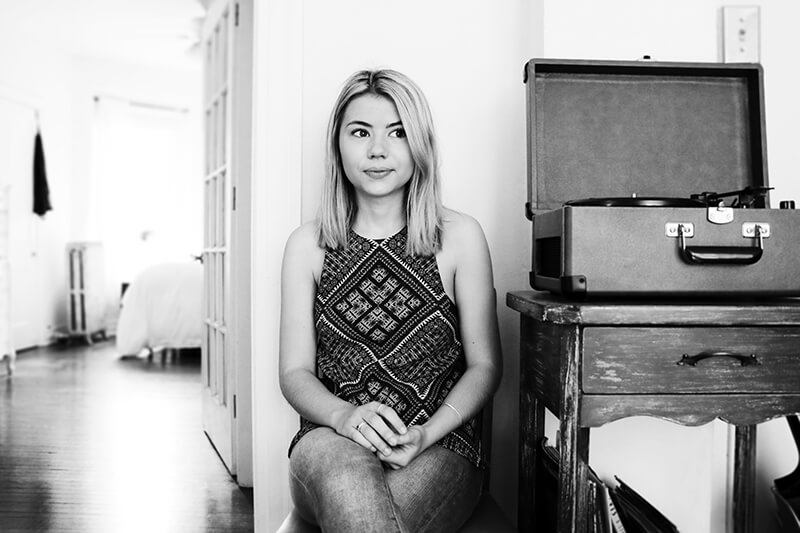Signed to an independent label for her first two projects, Nashville’s Hayley Reardon decided to go fully independent with her latest album, Good.
While there are many causes worth funding today, music is a universal language that brings people together and spreads joy, especially in dark times. For Good, Reardon launched a crowdfunding campaign to raise funds that would have otherwise been provided by a label. Reardon notes:
“Asking people for money is always weird no matter what you’re raising funds for, but it was especially difficult for me to wrap my head around asking people to support me and my dreams when they could be using that same money to support starving children or cancer research. That was the first hurdle, beyond the sheer amount of work and creative energy that would go into completing the campaign, that I didn’t quite see coming.”
RELATED: Hayley Reardon – “Wayfindings” Review

Hayley Reardon photo by Lindsay Brandt
Funding something as joyful as music goes a long way, for both the artist and for the fan. It gives the artist a creative outlet to share the ups-and-downs of life and it gives the fans a chance to relish the musical landscape and put the world into perspective. There is something out there bigger than ourselves and music helps give clarity to that.
Believing in yourself before others can believe in you is intrinsic. Trusting your musical ability and having faith in your craft is the first step to putting yourself out there. Reardon was able to convince herself that her music deserved a shot. To make that a reality, she asked her fans for help. She notes, “The outpouring of support was remarkable and gave me the boost of enthusiasm that I needed to really put everything I had into creating the music.”
As a fully independent musician, you are in charge of funding and creating the music. Some consider this division of time to be a downside. Reardon says:
“Creative energy and bandwidth can be a distraction from the music. A pro, on the other hand, is that asking for help and getting your fans behind your project from the very beginning reminds you that people are listening. It reminds you that there are people in the world who care about what you are doing and are eagerly awaiting its arrival.”
Hayley Reardon photo by Lindsay Brandt
For Reardon, knowing that people want her music gave her the sense of purpose and perseverance she needed to create an album that she is proud of.
On Good, the lyrics and instrumental tones are so deeply personal and it is clear that music enhances Reardon’s storytelling. “You only have three minutes to express an idea that may take an entire lifetime to figure out…but for whatever reason, I find something super empowering and liberating within the limitations of songwriting,” she says.
She goes on to explain that the visceral components of music making (melody, chord structure, instrumentation, tone, meter, timing, etc.) can both support or undercut the words you choose to tell your story. Writing your story is a journey within itself. Choosing only the best words and notes so they complement each other to elevate the song is of utmost importance. Reardon reflects comments that “the hard part is that you can’t just say what you want and be done, you have to be able to feel what works; it’s like trying to put a puzzle together in the dark.”
Reardon doesn’t have a set process for how she incorporates musical elements into her storytelling, because every experience is unique and her journey of feeling what works, and what doesn’t, varies. Reardon notes, “I can say, however, that songwriting is the method of storytelling (to date, at least) that has allowed me to access the deepest, most personal place within myself.” Getting to know how being a musician intertwines with everyday life doesn’t necessarily have a static moment of clarity. Reardon attributes the changes in her folk sound to her overall growth as a person and changes in her life.
In terms of the musicality on Good, Reardon lets creativity take its course, allowing for a chain reaction where one thing inspires another – whether it is a lyric, concept, chord or melody. Her creative process tends to happen all in one sitting. Reardon notes that she tries not to question things because it tends to slow down the process. She notes that “songs come out quick and I think the most difficult task is to learn how to not squash them before they’ve had the chance to reveal what might be hiding behind that initial idea.” Staying out of her own way poses to be one of the most difficult parts of the creation process.

Hayley Reardon photo by Lindsay Brandt
In order to give the album an organic feel, Reardon tracked everything live. Overdubbing did play a role later on, but the album was approached with having rawness in the initial recording sessions.
One of Reardon’s strengths as both a songwriter and an artist is the impeccable job she does connecting with her listeners through recordings in a similar way in which she would do in a live show. Her favorite part of the live experience is the same for the performer in her as it is for the fan in her. Reardon notes, “I love telling stories and crafting a sense of flow and intimacy between songs. Lastly, I love the challenge of trying to steal and maintain people’s attention as a solo, 5-foot-flat girl with just a guitar and a microphone.”
Follow Hayley Reardon Online
http://twitter.com/hayleyreardon
http://soundcloud.com/hayley-reardon
http://www.instagram.com/hayleyreardon

